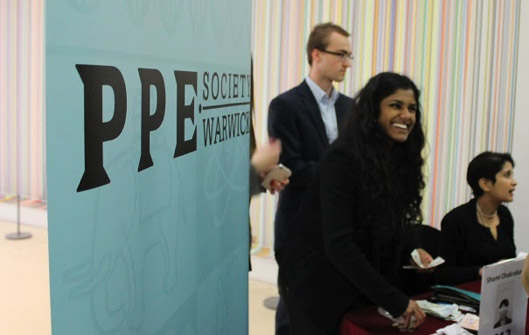Other Activities
As a PPE student, you will have access to numerous extra-curricular events and opportunities further enrich your student experience, including lectures by visiting academics and guest speakers, mentoring, careers events and numerous personal development opportunities.

Warwick PPE Society
Established in 2004, the Warwick PPE Society is a dynamic student-run academic group that hosts a range of events related to Philosophy, Politics and Economics.
The Society aims to bring together all students with an interest in the disciplines, and with over 1000 members it certainly engages with more students than those on the course.
The Society runs speaker events, supports careers development and arranges a range of social activites from sports teams, international trips and the annual PPE Ball.
Other Societies
- Economics Society
- Politics Society
- Philosophy Society
- International Development Society
- Warwick Globalist
- Any many more - Warwick SU has over 250 socities, so there is bound to be one for you!
Economics 360 Lecture Series
Each year the Department of Economics hosts Economics 360; a special lecture series presented by the Department of Economics designed to broaden the education experience and help students interpret what they have learnt in lectures and classes to interesting and important real world situations and subjects.
Previous speakers have included Paul Seabright (Professor at The Toulouse School of Economics, Director of The Institute for Advanced Study in Toulouse and Member of The Institut d'Economie Industrielle), Angus Armstrong (Director of Rebuilding Macroeconomics and Chief Economic Adviser at Lloyds Bank Group), and Andy Haldane (Chief Economics and Executive Director of Monetary Analysis and Statistics, Bank of England).
PAIS Film Series
Politics and International Studies run a departmental film club, which regularly screens documentaries and feature films that focus on the political themes students explore in their undergraduate and postgraduate learning. Films range from Hollywood blockbusters such as Argo and Zero Dark Thirty to independent or foreign-language films such as The Lives of Others and La Haine. Documentary screenings have included Countdown to Zero, When China Met Africa and The Fog Of War. Each film is introduced by a member of academic staff and is followed by an informal discussion, enabling students to share opinions.
Undergraduate Research Support Scheme (URSS)
The Undergraduate Research Support Scheme enables undergraduate students to carry out an interdisciplinary summer research project. The scheme is open to any UG student at Warwick. Successful students receive a bursary and skills development training to carry out their project, and students' achivements are celebrated at the Research Showcase in November.
PPE Research Assistants
Every year we have new opportunities for PPE students to work as Research Assistants, working with academic members of staff to support research, teaching and student experience in Philosophy, Politics and Economics. As a Research Assistant, students are paid to work on a project with an academic and gain a greater understanding of research and teaching at university. Current research projects include:
- The Sense of Commitment: An Integrative Framework for Modelling the Sense of Commitment
Combining theoretical research conducted at the Department of Philosophy with carefully designed lab experiments carried out at Warwick's Department of Psychology and at the Department of Cognitive Science at the Central European University in Budapest, the project will illuminate how and when people are willing to make and honor commitments, and to rely on others’ commitments, and will also shed light on the emergence of a sense of commitment in young children.
- Bathing in the Multitude: Sociability in the City
Although the world is fast becoming majority urban, the city has only rarely been viewed as a promising venue for meaningful associational life, more often described with reference to anomie and loneliness. However, the anonymity and density afforded by cities is also felt by many to be an inherently liberating, sometimes even erotic experience. Is there a necessary tension between the meeting of our social needs and the patterns and practices of urban living? If so, how should we assess this tension?
